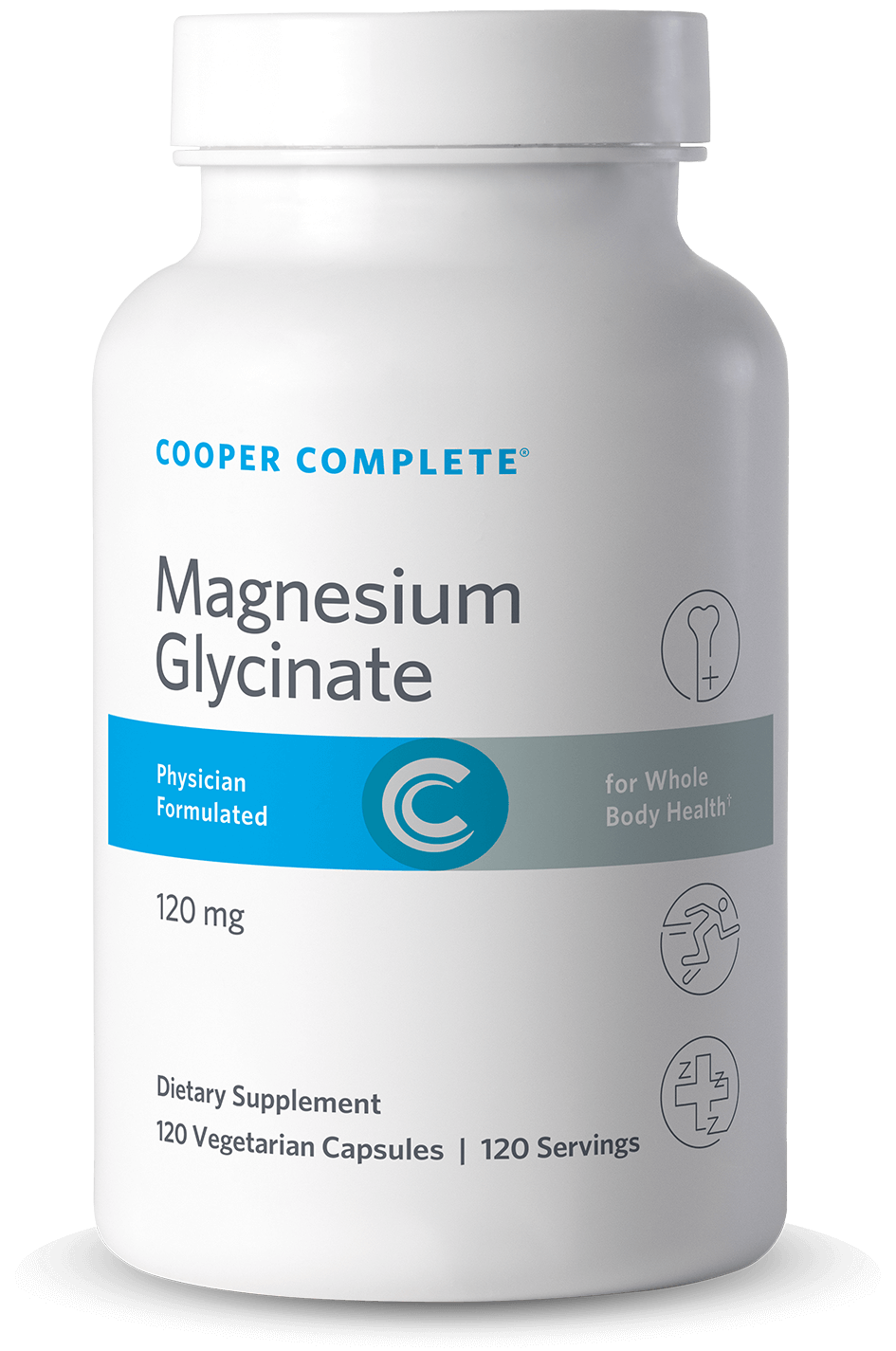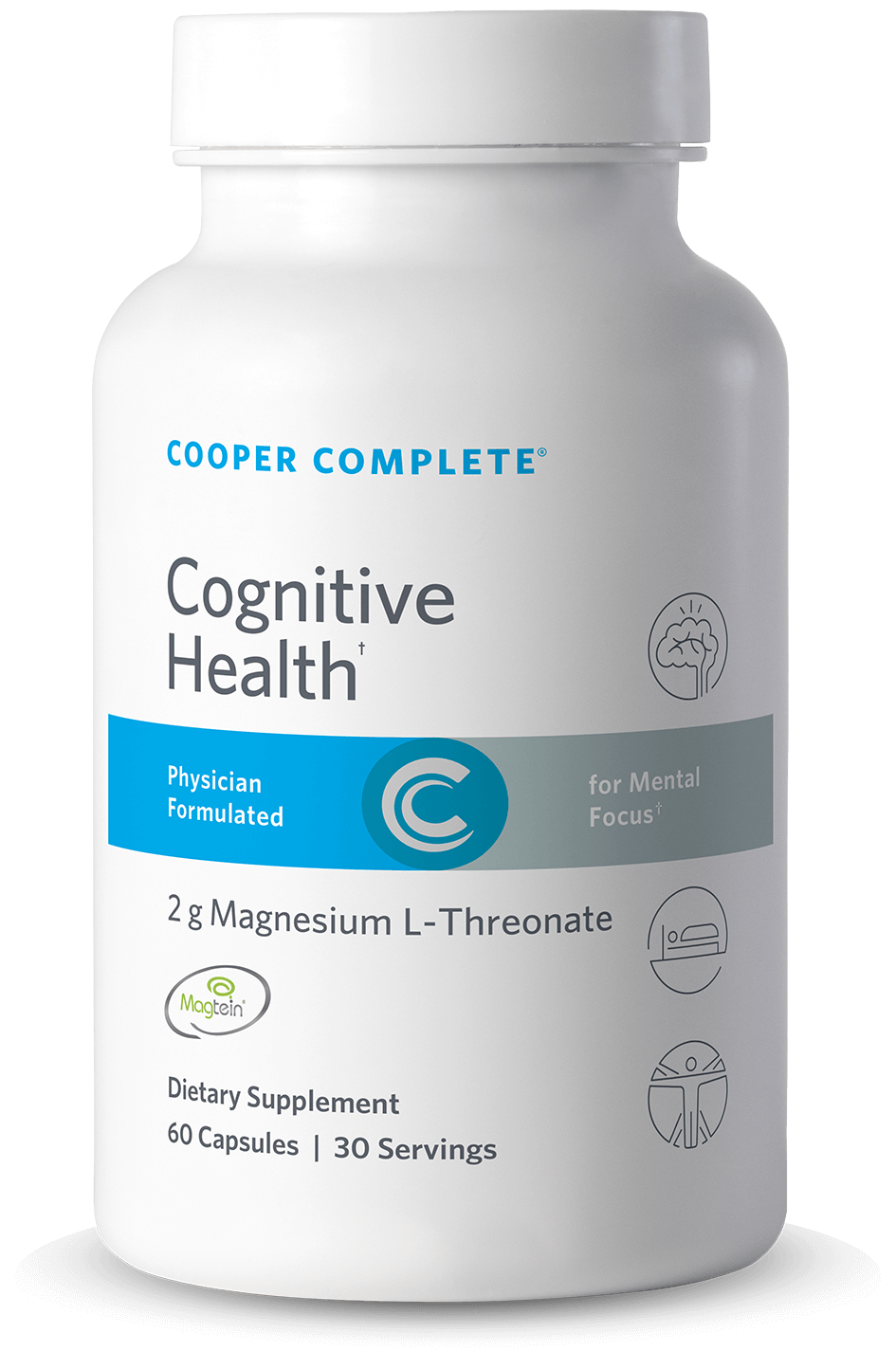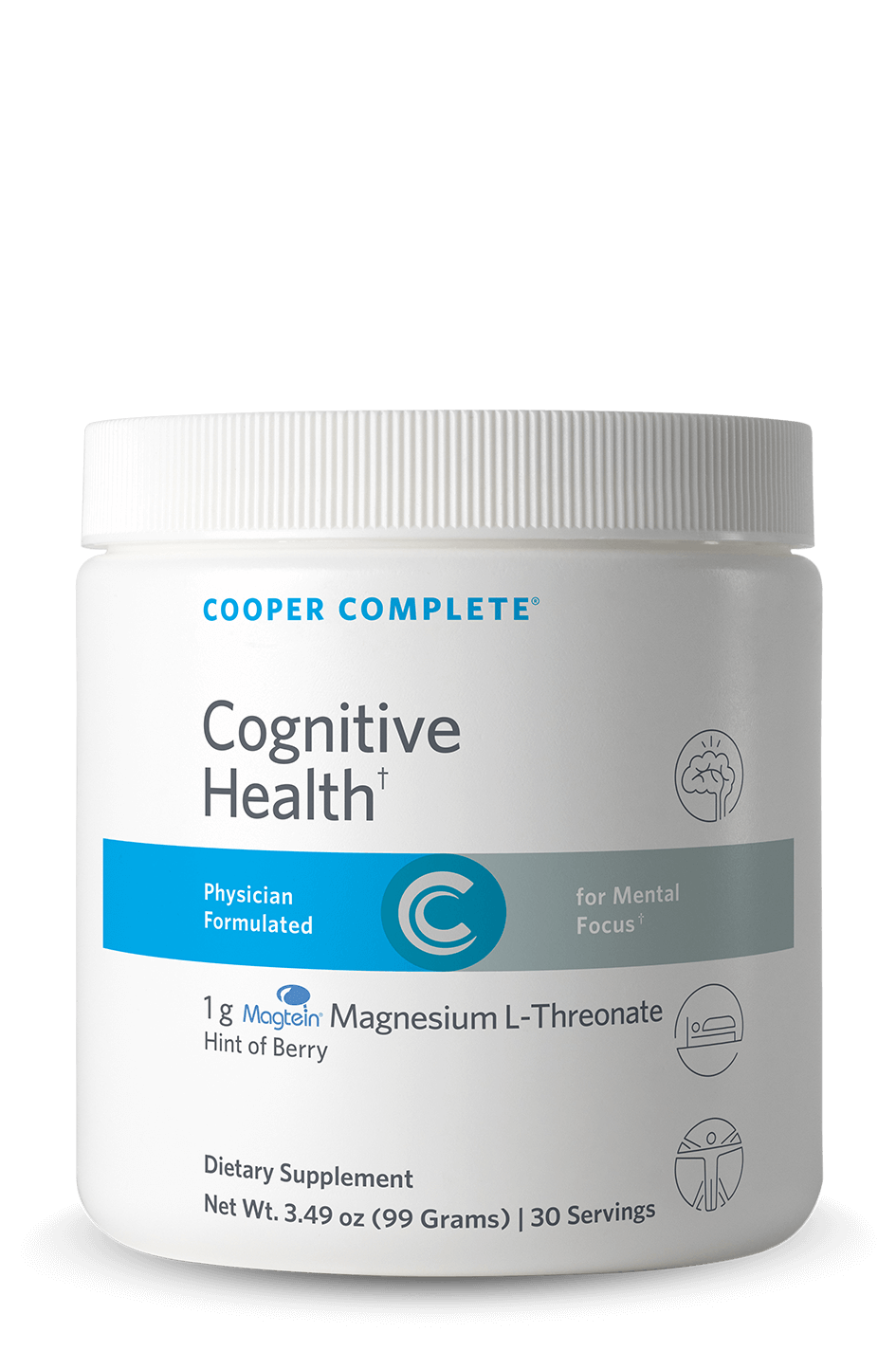Magnesium Supplement Benefits for a Healthy Body

Magnesium supports energy production, restful sleep, bone strength, and heart function†, making it an essential mineral for overall health†. It plays a crucial role in converting food into fuel, regulating daily rhythms, and helping the body maintain strong bones and a steady heartbeat†.

120 mg Magnesium Glycinate Supplement
Chelated magnesium glycinate (also known as magnesium bis-glycinate) is well absorbed without significant laxative effects.
$24.98 Add to cartQuick Summary
- Magnesium is an essential mineral that supports energy production, sleep, bone strength, and heart function†.
- It plays a role in regulating daily rhythms, converting food into fuel, and supporting healthy muscle and nerve activity†.
- Different forms of magnesium—such as glycinate, L-threonate, and oxide—offer targeted benefits for relaxation, brain health, and overall wellness†.
- Magnesium-rich foods include leafy greens, whole grains, legumes, and nuts; supplements can help fill dietary gaps†.
- Cooper Complete offers magnesium in multivitamins, standalone glycinate, and cognitive health formulas with Magtein®†.
Table of Contents
Click to expand
Magnesium supplements come in many forms, each with different benefits†. Some are better suited for digestive support, while others may help with sleep, cognitive health, or muscle function†. Even topical options like magnesium chloride and magnesium sulfate (better known as Epsom salt) are popular for muscle relaxation and soreness†.
At Cooper Complete, we offer several forms of magnesium tailored for specific areas of health†. For general wellness, our Magnesium Glycinate is gentle and highly absorbable†. For cognitive support, our Cognitive Health Capsules and Scoopable Magnesium Blend feature magnesium L-threonate (Magtein®), along with glycerophosphate and acetyl taurinate, to help raise magnesium levels in the brain†. (Learn more in our article, Unlock the Health Benefits of Magnesium L-Threonate.) Our multivitamins contain magnesium oxide to help meet daily intake needs†.
|
Magnesium Comparison Chart |
|||
|---|---|---|---|
| Magnesium Form | Common Uses | Notes | |
| Magnesium Acetyl Taurinate | Cognitive support† | Emerging form included in cognitive blends; more research needed†. Found in Cooper Complete scoopable magnesium. | |
| Magnesium Chloride | Topical use, digestion, general supplementation† | Sometimes used in “magnesium oil” sprays for topical absorption; also available in oral form†. | |
| Magnesium Citrate | Occasional constipation support | Often used for digestive regularity; can cause loose stools in high doses†. | |
| Magnesium Glycerophosphate | Cognitive and general support† | Often used in combination blends; may support brain and overall function†. Found in Cooper Complete scoopable magnesium. | |
| Magnesium Glycinate | Sleep, relaxation, gentle on the stomach | Chelated form; well tolerated and effective for overall health†. Found in Cooper Complete Magnesium Glycinate. Compare with Magnesium Citrate. | |
| Magnesium L-Threonate (Magtein®) | Cognitive health, memory, focus† | Shown to raise magnesium levels in the brain†. Found in Cooper Complete Cognitive Health products. | |
| Magnesium Malate | Energy production, muscle discomfort† | May support physical performance; often used by those with fatigue†. | |
| Magnesium Oxide | General supplementation | Delivers a high amount of elemental magnesium in a small amount of space†. Found in Cooper Complete multivitamins. | |
| Magnesium Sulfate (Epsom Salt) | Muscle relaxation, baths, occasional laxative† | Commonly used in baths to soothe sore muscles; oral use is limited due to digestive side effects†. | |
| Magnesium Taurate | Heart and cardiovascular health† | Combines magnesium with taurine for synergistic cardiovascular support†. | |
Overall, magnesium is the fourth most abundant mineral in our bodies. In fact, about fifty to sixty percent of the body’s magnesium is found in our bones. It protects vital processes in the body to maintain a healthy lifestyle†.
Why Magnesium Matters for the Body†
How Magnesium Supports Energy Levels†
Energy production is critical to keeping the body running properly. Magnesium helps convert the food we eat into usable fuel. Whether it is fats, proteins or carbs, these foods all need magnesium for the body to use them.
Furthermore, a lack of magnesium in a balanced and healthy diet has similar opposite effects. Low magnesium intake has been associated in research with changes in glucose metabolism†. Magnesium plays a role in how the body uses insulin, which may influence energy levels. This symptom is related to insulin resistance that develops in the absence of magnesium†.

Cognitive Health Magnesium L-Threonate 2 g
Premium Magnesium L-Threonate supplement helps support brain health, including memory, focus, and cognitive clarity. Formulated for adults seeking to maintain cognitive performance as they age, it promotes overall brain function and resilience.†
$59.98 Add to cartMagnesium’s Role in Bone Strength†
Magnesium works alongside vitamin D, calcium, and other nutrients to support strong bones†. For vitamin D, magnesium creates a loop where magnesium helps the body absorb vitamin D†. This loop completes as vitamin D and then increases magnesium use in the body†. Breaking this loop with low levels of either nutrient leads to numerous problems. Low magnesium or vitamin D intake can affect bone strength and structure†.
Calcium’s connection to magnesium involves a similar relationship loop†. Magnesium protects the body by controlling calcium amounts in bones and their cells†.
First, magnesium prevents excess calcium from forming in one place. However, it also prevents calcium from leaving a cell when low amounts are present. Bones rely on this process for structural strength. Specifically, magnesium protects the bones from excessive calcium removal, resulting in brittle bone structure†.
Magnesium and Sleep Quality†
Lack of sleep can be a contributing factor in many health issues†. Poor sleep can affect overall health and well-being†.
This mineral plays a role in regulating the body’s natural rhythms, including the sleep-wake cycle†. A study found that magnesium levels rose and fell based on a 24-hour sleep cycle. This correlates with increased energy production during the awake hours and reduced energy output at night.
Magnesium and Heart Function†
Magnesium plays an important role in maintaining healthy heart rhythm and vascular function†. Magnesium interacts with the heart and its connections. One way is helping blood vessels relax and pump at a lower pressure†.
It is also an important electrolyte for muscle function†. Exercise causes a loss of magnesium through sweat, like many electrolytes. Furthermore, low electrolyte levels increase the risk of muscle cramps and spasms†. With the heart being a muscle in the body, healthy electrolyte levels can ensure healthy heart function during physical activity†.
Finally, further studies on heart disease and heart failure have shown the importance of magnesium†. A study published by the American Heart Association confirms this. An association was found between low magnesium levels and an increase in mortality rates from heart disease†.

Cognitive Health Magnesium L-Threonate Powder 1 g
A delicious blended mixed berry magnesium L-threonate powder designed to support focus, memory, mood, and sleep†—featuring a unique blend of three highly absorbable forms of magnesium.
Save 50% on this short-dated item—best by January 31, 2026.
$29.49 Add to cartMagnesium in Foods and Supplements†
Dietary Sources of Magnesium
Foods that are high in fiber generally have high levels of magnesium. Dietary sources of magnesium include whole grains, vegetables, seeds, and nuts. In addition, other sources include dairy products, meats, chocolate, and coffee.
Magnesium Supplements to Help Maintain Healthy Levels†
The daily recommended intake for magnesium is 400 mg for men 19 to 30 years of age and 420 mg for men over 30 years of age, 310 mg for women 19 to 30 years of age and 320 mg for women over 30 years of age. Cooper Clinic routinely tests magnesium levels as part of the comprehensive preventive. For example, A normal blood plasma level is 1.8 to 2.4 mg/dL.
Cooper Complete Basic One Multivitamin contains 200 mg of magnesium and 660 mg of magnesium in our Original Multivitamin.
Frequently Asked Questions and Final Thoughts
Magnesium plays a key role in supporting energy, sleep, bone strength, and cardiovascular function†. Whether through food or supplements, maintaining healthy magnesium levels is key†. Below are a few common questions and answers to help you decide what’s best for your needs.
Q: What is the best form of magnesium to take?
A: There is no one-size-fits-all answer; the best form depends on your particular health goals. For example, magnesium glycinate is often used to support overall health, sleep, and relaxation†, while magnesium L-threonate may help promote cognitive function†.
Q: How much magnesium do I need each day?
A: Most adult men need 400-420 mg daily, while adult women need 310-320 mg, depending on age. These amounts may vary based on health status, activity level, and diet. Your physician or health care provider can help you determine the correct dosage for your needs.
Q: Are there signs of low magnesium levels?
A: Low magnesium intake may lead to symptoms like fatigue, muscle cramps, or poor sleep quality†. Severe deficiency is less common but can affect nerve and muscle function†. Routine lab testing can reveal magnesium status.
Q: What’s the difference between magnesium glycinate and citrate?
A: Both are popular forms, but they work a bit differently. Read our full comparison here.
Q: Can magnesium supplements be taken daily?
A: Yes, magnesium is safe for daily use when taken at recommended levels. Many people take it as part of a multivitamin or in targeted forms for specific support, such as at bedtime†. Talk with your physician or health care provider if you’re taking multiple supplements to avoid exceeding recommended levels. Too much magnesium, even in gentler forms, can contribute to GI discomfort and diarrhea.
Q: What makes magnesium L-threonate different from other forms of magnesium?
A: It’s the only form shown to increase brain magnesium levels. Explore the benefits of magnesium L-threonate.
Q: What are some foods that are naturally high in magnesium?
A: Magnesium-rich foods include leafy greens, legumes, nuts, seeds, whole grains, and even dark chocolate. Incorporating these into your diet helps support daily intake needs alongside supplementation if needed†.
As a reminder, your physician understands your health profile best, so it’s important to talk to them about which supplements are best for you.
About the Author: Jill Turner is the President of Cooper Complete® Nutritional Supplements, where she oversees product development and customer experience. She enjoys writing about vitamins, supplements, and preventive health to help consumers make informed, science-backed decisions.
